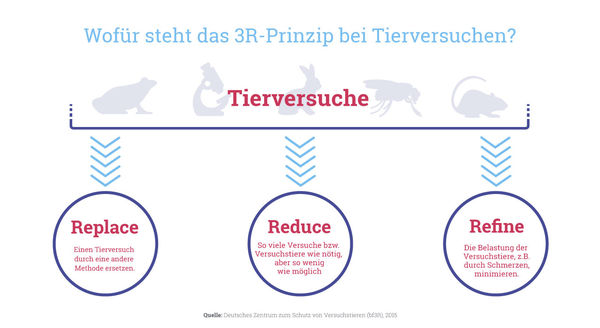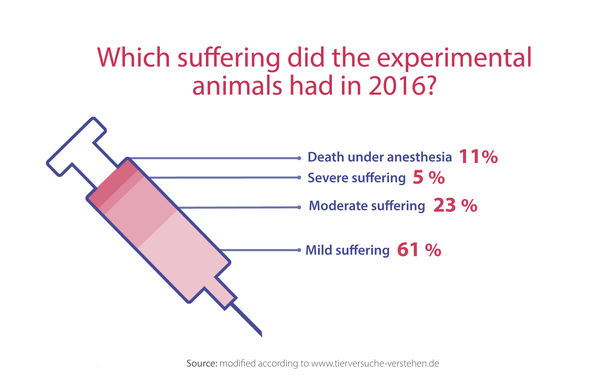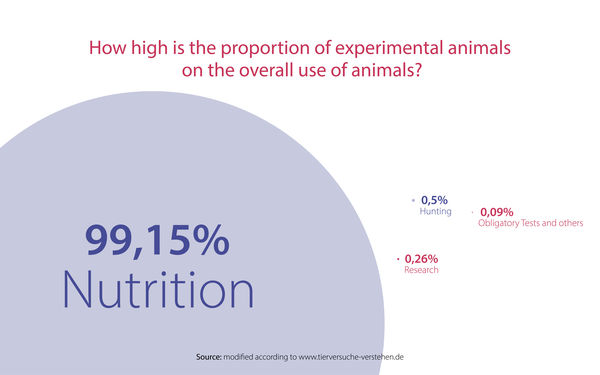Facts & Figures
On this page you will find useful information about the laws that regulate animal experiments, information about the animal application process and the principles according to which animal experiments can be carried out in Germany.
Animal experiments are very strictly regulated in Germany and the EU.
In Germany, animal welfare is a state objective and since 2002 has been legally bound in Article 20a of the Basic Law: "Mindful also of its responsibility toward future generations, the state shall protect the natural foundations of life and animals by legislation and, in accordance with law and justice, by executive and judical action, all within the framework of the constitutional order.''
Animal Welfare Act
Since 1972 there exist an in Germany that also protects experimental animals. This was revised in 2006 and 2013. In §1 is anchored: "The aim of this Act is to protect the lives and well-being of animals, based on the responsibility of human beings for their fellow creatures. No one may cause an animal pain, suffering or harm without good reason."
Directive 2010/63/EU and Animal Welfare Regulation Governing Experimental Animals
on the protection of animals used for scientific purposes was adopted in 2010 and subsequently implemented into national law. This was done in 2013 with the and adjustments in the Animal Welfare Act.
The 3R principle is the fundamental ethical principle of laboratory animal science. It is embedded in the Directive 2010/63/EU and thus a legally binding requirement for all member states. The principles of the EU Directive have been implemented into national law.
The 3R concept was founded in 1959 by William Russell and Rex Burch (“The Principles of Human Experimental Technique”).
What are the 3Rs?
Replace:
- Whenever possible, an animal experiment must be replaced with an alternative method.
Reduce:
- Only as many experimental animals as absolutely necessary must be used.
Refine:
- The suffering of the experimental animals must be reduced. This includes an improved housing of the animals.
How are the 3R implemented at the FLI?
Replacement
- Whenever possible, scientific hypotheses are first tested in cell culture (in vitro) before an animal experiment is performed. Another approach is the establishment of a new department for bioinformatics at the FLI. In addition, the FLI offers the possibility to avoid animal experiments on vertebrates by conducting studies on invertebrate species such as nematodes and flies or, in the case of fish, on embryonic stages, i.e. on fish eggs and fish larvae.
Reduction
- In order to obtain meaningful results, it is essential to conduct experimental planning before starting the experiment. In addition to the advice of the Animal Welfare Officer, the researchers at the FLI have the opportunity to consult a biostatistician. Thereby, suitable group sizes and numbers of animals can be calculated in advance. Such careful experimentation helps to reduce animal numbers and avoids repetitions of animal experiments. Furthermore, we created a database in order to facilitate sharing of animals throughout the FLI, to reduce animal breeding numbers.
Refinement
- Through close cooperation between animal caretakers, scientists and animal welfare officers, we ensure that the animals are optimally monitored and cared for in animal experiments.
In our Animal Welfare Body new approaches to refinement are discussed and tested, so we can work towards a continuous improvement of animal welfare.
Currently our focus is on the following topics:
- Use of different environmental refinement in mouse and fish husbandry
- Improvement of the handling of the animals
- Replacing invasive genotyping methods with non-invasive methods
- Research on pain assessment in fish.
How to submit an animal experiment application?
A permit is required to carry out an animal experiment in Germany. In Thuringia, this is the Thuringian State Office for Consumer Protection (Thüringer Landesamt für Verbraucherschutz, TLV), an upper state authority of the Free State of Thuringia.
The process begins when the scientist writes an animal experiment application. In the application it should be explained in detail and comprehensively why the project is indispensable in order to answer a specific scientific question and why animals should be used for this purpose. In this context, it must always be checked whether alternative methods can be used and it must be ensured that the research question has not been investigated worldwide.
However, if the animal experiment is indispensable, the "R's" "Reduction" and "Refinement" must be implemented. The animal experiment application is first examined by the Animal Welfare Officers. They give suggestions for improvement of animal welfare and add an independent evaluation (statement). The application together with the statement of the Animal Welfare Officer will then be sent to the responsible authority. They examine the application and get support by a Animal Welfare Body. This commission consists of scientists, ethicists, statisticians and representatives of animal welfare organizations. They give an assessment of the animal experiment application to the authority. The authority either approves or rejects the application or asks further questions. If an application fulfills all relevant animal welfare criteria, it will be approved.
If the application is approved, the project may be carried out. The further inspection of the execution and documentation of the experiment is then the responsibility of the animal welfare officer and externally of the official veterinarian. The official veterinarian of the veterinary office can inspect the experiment unannounced. In addition, interim and final reports are requested from the scientist to document data and facts about the course of the animal experiment. If deviations are detected during these inspections, whether by the animal protection officer or the official veterinarian, an animal experiment can and will be stopped.
When performing animal experiments, it is necessary to reflect about the suffering of the animals before, during and after the experiment and how to reduce it. specifies 4 severity categories:
- No recovery of life function: Procedures in which animals are euthanized without pretreatment for scientific purposes or experiments, which are performed entirely under general anesthesia from which the animals do not awaken, are classified as "no recovery of life function".
- Mild: Procedures that cause short-term pain, distress or anxiety in the animals, e.g. a single blood withdrawal or a single injection. These are procedures that are also routinely carried out in the veterinary practice.
- Moderate: Procedures that cause short-term moderate pain, moderate distress or anxiety, or prolonged mild suffering in the animals, as well as procedures that cause moderate harm to the animals' welfare or general condition e.g. surgery under general anesthesia and the use of painkillers.
- Severe: Procedures that cause severe pain, distress or anxiety in the animals, or long-term moderate pain, moderate distress or anxiety, and procedures that cause severe harm to the animals' welfare or general condition, e.g. associated with the death of the animals, or in sepsis or cancer research. Currently, no severe animal experiments are carried out at the FLI.
Animals that have been used in experiments must be reported to the competent authority once a year. In addition, the number of euthanized vertebrates for scientific purposes must be reported. If animals are euthanized without pretreatment for scientific purposes this is not considered an animal experiment according to the law, nevertheless these numbers must be integrated into the reporting of animal numbers.
Like the other EU states Germany is obliged to the regulation of reporting animals. The exact procedure is regulated in the . The notification covers the species, origin and number of all vertebrates or cephalopods used, as well as the purpose, type and severity grade of the experiments. The numbers are published on the homepage of the and can be accessed by anyone.
Contact
Dr. Beate Hoppe
Animal Welfare Officer
+49 3641 65-6605
Links
Video about
"The 3R Principle: Replace Reduce Refine"
Further information about
Approval procedures for animal experiments
(in German only)












